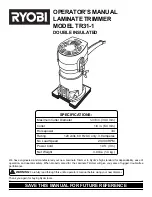
EN
43
• Unmodified plugs and matching outlets reduce the risk of electric shock.
• Avoid body contact with earthed surfaces such as pipes, radiators, cookers and
refrigerators.
• There is an increased risk of electric shock if your body is earthed.
• Do not expose the tool to rain or moisture.
• There is an increased risk of electric shock if water enters a power tool.
• Never use the power cord to carry or pull the tool, or to pull out the plug from
the mains socket. Keep the power cord away from heat, oil, sharp edges and
moving parts.
• Damaged or tangled power cords increase the risk of electric shock.
• If using the tool outdoors, only use an extension cord approved for outdoor
use.
• Cords intended for outdoor use reduce the risk of electric shock.
• If it is absolutely necessary to use power tools in damp conditions, use a mains
connection protected by an RDC. Using an RCD reduces the risk of electric
shock.
Personal safety
• Stay alert. Pay attention to what you are doing, and use your common sense
when working with the tool. Never use power tools if you are tired or under the
influence of drugs, alcohol or medication.
• A moment of inattention when using a power tool can result in serious
personal injury.
• Wear safety glasses and appropriate personal safety equipment.
• Depending on the type of power tool and how it is used, safety equipment
such as dust masks, non-slip safety shoes, gloves, safety helmets and ear
protection reduce the risk of personal injury.
• • Avoid accidental starting. Check that the power switch is in the OFF position
before plugging in the power cord and/or the battery, or lifting/carrying the
tool.
• Carrying a power tool with your finger on the switch, or connecting a tool to
the mains supply when the switch is in the ON position, increases the risk of
accidents and injuries.
• Remove Allen keys/spanners etc. before starting the tool.
• Spanners or the like that are left in a rotating part of the tool can cause
personal injury.












































